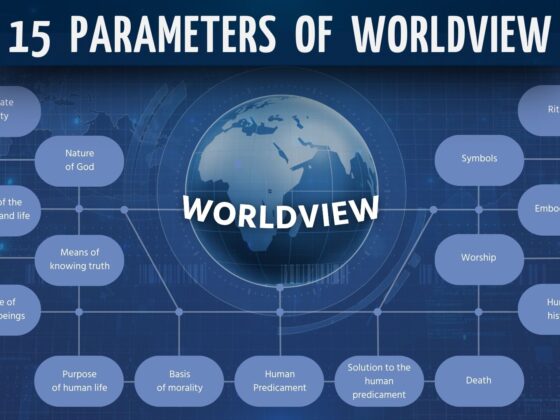Understanding Human Nature: Are We Basically Good or Bad?
November 26, 2024
Are We Basically Good or Bad?
The Question That Defines Worldview
When students grow up believing that humans are inherently good, their entire worldview shifts. They may see sin, salvation, and moral responsibility in ways that diverge from biblical truth. However, if they understand the biblical perspective on human nature, they gain a foundation that supports a robust Christian worldview. This question—whether humans are basically good or bad—is foundational to understanding our need for redemption and the role of Christ in our lives.
Secular culture often promotes the idea that humans are fundamentally good, with the potential for great achievement and moral virtue (more about that in a moment). This contrasts sharply with the biblical view, which portrays human nature as fallen and in need of a Savior. Jeremiah 17:9 states, “The heart is deceitful above all things and beyond cure. Who can understand it?” This verse encapsulates the biblical understanding of human nature as fundamentally flawed and in need of divine intervention.
Biblical Anthropology: Understanding the Human Condition
To grasp the depth of human sinfulness, we must start with the doctrine of original sin. According to Genesis 3, the Fall of humanity began with Adam and Eve’s disobedience in the Garden of Eden, which had catastrophic consequences for all of humanity. Sin entered the world, and with it, death and separation from God. As Romans 3:23 reminds us, “For all have sinned and fall short of the glory of God.” This universal condition affects every aspect of human existence.
The Bible consistently teaches that human nature is not only flawed but actively inclined toward evil. In Genesis 6:5, we read, “The Lord saw how great the wickedness of the human race had become on the earth, and that every inclination of the thoughts of the human heart was only evil all the time.” This verse highlights the pervasive nature of sin, which affects even our innermost thoughts and desires. Moreover, Ephesians 2:3 states, “All of us also lived among them at one time, gratifying the cravings of our flesh and following its desires and thoughts. Like the rest, we were by nature deserving of wrath.” This reinforces the idea that our natural state is one of rebellion against God, deserving of His righteous judgment.
Opposing Worldviews
Several worldviews challenge the biblical understanding of human nature. Let’s investigate them and hold them up against the Bible.
Secular Humanism
For example, secular humanism emphasizes human potential and inherent goodness, denying the need for divine intervention. Yet Psalm 14:1 counters this, stating, “The fool says in his heart, ‘There is no God.’ They are corrupt, their deeds are vile; there is no one who does good.” This verse starkly contrasts with the humanist view, highlighting the futility of denying God’s existence.
Postmodernism
Postmodernism also poses a challenge by relativizing truth and morality. It leads to a rejection of absolute standards of good and evil, as described in Judges 21:25: “In those days Israel had no king; everyone did as they saw fit.” This relativism undermines the concept of sin and, by extension, the need for salvation. Without a clear understanding of human nature’s inherent sinfulness, students may be led astray by the shifting sands of cultural opinion.
Eastern Pantheism
Eastern pantheism views human nature as divine, part of a larger cosmic consciousness. This worldview minimizes the concept of sin, instead focusing on achieving enlightenment or harmony with the universe. Romans 1:25 addresses this, saying, “They exchanged the truth about God for a lie, and worshiped and served created things rather than the Creator—who is forever praised. Amen.” This verse underscores the dangers of idolatry and the need to recognize the Creator’s authority over creation.
Communism and Socialism
Communism and socialism promote the idea that human nature can be perfected through social and economic structures, often rejecting the need for a Savior. Psalm 2:1-3 challenges this notion, declaring, “Why do the nations conspire and the peoples plot in vain? The kings of the earth rise up and the rulers band together against the Lord and against his anointed, saying, ‘Let us break their chains and throw off their shackles.'” This passage highlights the futility of human attempts to achieve perfection without acknowledging God’s sovereignty.
Critical Race Theory
Critical Race Theory views human nature as primarily shaped by power dynamics and systemic oppression. This worldview often emphasizes social constructs over individual moral responsibility. Acts 17:26 challenges this, stating, “From one man he made all the nations, that they should inhabit the whole earth; and he marked out their appointed times in history and the boundaries of their lands.” This verse highlights God’s sovereignty in creation and the unity of humanity, countering the divisive narratives that CRT can promote.
Redemption and Hope: The Role of Jesus Christ
Ultimately, the gospel is the only answer to the problem of human sinfulness. Jesus Christ’s sacrifice on the cross provides the only means of redemption and reconciliation with God. Romans 5:8 declares, “But God demonstrates his own love for us in this: While we were still sinners, Christ died for us.” This verse encapsulates the hope that we have in Christ, despite our sinful nature.
Other worldviews offer inadequate or false solutions to the problem of human nature. Whether through self-improvement, enlightenment, or social reform, these approaches fall short of addressing the root issue—sin. Only through Christ can we find true forgiveness and transformation. John 14:6 affirms, “Jesus answered, ‘I am the way and the truth and the life. No one comes to the Father except through me.'” This exclusivity of Christ as the only path to salvation is a cornerstone of the Christian faith and must be central in our teaching.
Implications for Christian Education: Building a Mature Biblical Worldview
A biblical understanding of human nature is essential for effective teaching and discipleship. It informs how we approach moral education, the need for repentance, and the importance of grace. Proverbs 22:6 advises, “Start children off on the way they should go, and even when they are old they will not turn from it.” Educators have a profound responsibility to instill a biblical worldview in their students, ensuring they understand the true nature of humanity and the necessity of Christ’s redemption.
Integrating or ignoring secular views of human goodness in Christian education can be dangerous. It risks diluting the gospel and misleading students about the reality of sin and the need for salvation. To counteract this, educators must be vigilant in teaching the truth of Scripture, using tools like the 3-Dimensional Worldview Survey to assess students’ understanding of these critical concepts. This assessment can help identify areas where students may be influenced by secular thinking and guide them toward a more biblically sound worldview.
Moreover, 2 Timothy 3:16-17 reinforces the importance of Scripture in this endeavor: “All Scripture is God-breathed and is useful for teaching, rebuking, correcting and training in righteousness, so that the servant of God may be thoroughly equipped for every good work.” By grounding students in the Word of God, educators can equip them to discern truth from falsehood and to stand firm in their faith.
Assessing and Strengthening Worldviews in Your Institution
As leaders in Christian education, it is crucial to evaluate the worldview maturity of your students. A comprehensive assessment, like the 3-Dimensional Worldview Survey, can provide valuable insights into how well students understand and embrace a biblical worldview, particularly concerning the nature of humanity. This tool can be instrumental in guiding your educational efforts and ensuring that your students are well-equipped to navigate the challenges of a secular culture.
Now What?
Consider how you can incorporate these insights into your curriculum and teaching methods. Download our free PDF with 10 sample questions from the 3-Dimensional Worldview Survey to start assessing your students today. By taking this step, you can help shape the next generation to be grounded in a mature, biblical understanding of human nature, ready to live out their faith in a world that often opposes it.
Sometimes we need help understanding our students’ worldviews better, in order to mentor and discipline them in spiritual formation. We have a tool for that, the 3-Dimensional Worldview Survey.
- What Is the 3-D Worldview Survey?
- Take the 3-D Worldview for yourself
If you haven’t yet used the 3DWS with your class, check out the pdf below for some sample questions from the survey to get you started.
#3dworldview #biblicalworldview #assessingworldview
PS Be on the lookout: You might also enjoy reading The True Nature of Humanity: Understanding Worldviews in Education, coming to the blog soon.





